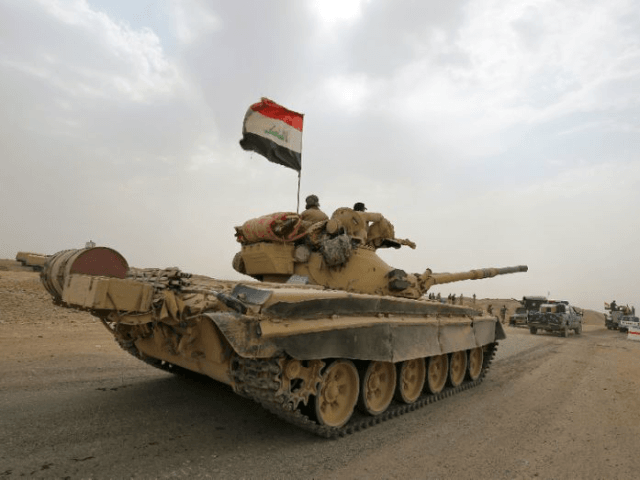The U.S.-backed Iraqi military has reportedly announced that it plans “to coordinate military efforts” with neighboring Iran, considered by the American government to be the leading state-sponsor of terrorism.
Reuters reports:
A top-ranking delegation from Iraq’s armed forces headed to neighboring Iran on Wednesday “to coordinate military efforts”, according to a statement from the Iraqi military.
The statement did not give any details about the aim of the visit, believed to be part of retaliatory measures taken by the government in Baghdad following the independence referendum held in Iraq’s northern Kurdish region on Monday.
Reuters points out that the Iraqi military issued its statement announcing cooperation with Iran on Thursday.
To the dismay of Iraq, Iran, Turkey, Syria, and even the United States, Kurds in Iraq’s autonomous Kurdistan region voted “yes” to independence.
Since the Sunni Islamic State (ISIS/ISIL) terrorist group surfaced in 2014, Iran has expanded its power over the Shiite-led government in Baghdad, boldly wielding it through militias in Iraq.
In March 2016, the Associated Press (AP) reported that the Shiite militia’s demand to be a significant force in shaping Iraq had induced fear among Iraq’s Sunni minority and officials in the Shiite-led government.
Iraqi government officials “fear the militias will dominate Iraq the way the Revolutionary Guard does Iran and the guerrilla group Hezbollah does Lebanon,” noted AP.
Nevertheless, amid the successful offensive to liberate Mosul late last year, which was backed by U.S. troops, Iran-allied Shiite militias managed to earn the official stamp of approval from Baghdad.
Known as the Popular Mobilization Forces (PMF/PMU) and Hashd al-Shaabi, the Shiite troops have recently threatened to march on Kurdish-held Kirkuk in Iraq in response to the referendum.
Neighboring countries like Iran fear the independence vote will ultimately fuel separatism among Kurds within their borders.
Turkey, Iran, and Iraq have threatened military action.
In recent days, Iran and Turkey started joint military exercises near their borders with the Kurdistan region, reports Reuters, adding that Baghdad and Ankara have also agreed to hold drills together.
Claiming Turkey, Iran, and Iraq are doing their best to overcome the referendum-linked “crisis,” Turkish Prime Minister Binali Yildirim said Ankara “would not shy away from giving the harshest response to a national security threat on its border, but that this was not its first choice,” reveals Reuters.
Iran reportedly exercises its influence over Baghdad through the estimated 100,000 to 120,000 Shiite PMF fighters in Iraq.
Echoing other assessments, Robin Wright of the U.S. Institute of Peace at the Woodrow Wilson International Center for Scholars suggested in July that the PMF may become Iran’s political proxy in Iraq much like the Shiite terrorist group Hezbollah in Lebanon.
A day before the Iraqi military announced that it planned to cooperate with their Iranian counterparts, Nicholas Rasmussen, the leader of the U.S. National Counterterrorism Center (NCTC), a component of the Office of the Director of National Intelligence (ODNI), told American lawmakers:
Iran remains the foremost state sponsor of terrorism, providing financial aid, advanced weapons and tactics, and direction to militant and terrorist groups across the Middle East, all while it cultivates its own network of operatives across the globe as part of its international attack infrastructure.
Lebanese Hizballah during recent years has demonstrated its intent to foment regional instability, by deploying thousands of fighters to Syria to fight for the [dictator Bashar al] Assad regime; providing weapons, tactics, and direction to militant and terrorist groups in Iraq and Yemen; and deploying operatives to Azerbaijan, Egypt, Thailand, Cyprus, and Peru to lay the groundwork for attacks.
Rasmussen’s comments came during a hearing on threats to the American homeland held by a Senate panel on Wednesday.
The U.S. military has long warned against the growing threat posed by operatives linked to Iran and its narco-terrorist proxy Hezbollah in the Western Hemisphere.
U.S. officials have cautioned that Hezbollah uses the vast amount of funds generated by drug trafficking, money laundering, and other illicit activities in Latin America to pay for terrorist activities in the Middle East.
“In the [U.S.] homeland, FBI’s arrest two months ago of two operatives charged with working on behalf of Hizballah was a stark reminder of Hizballah’s continued desire to maintain a global attack infrastructure that poses an enduring threat to our interests,” noted the ODNI chief.

COMMENTS
Please let us know if you're having issues with commenting.